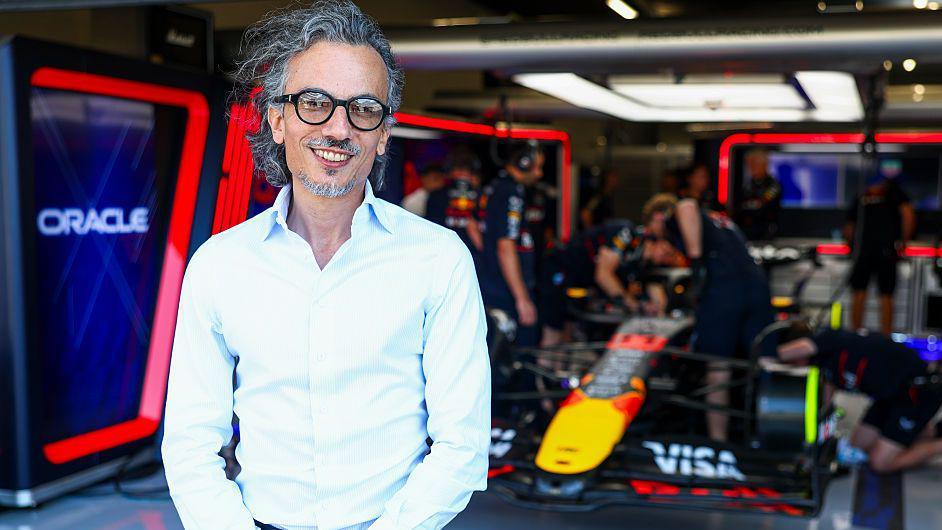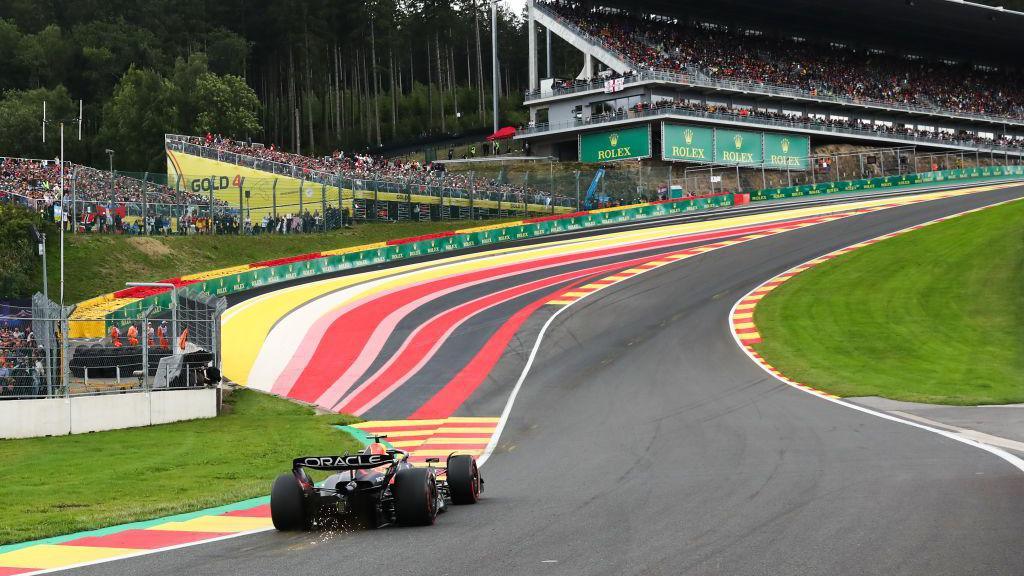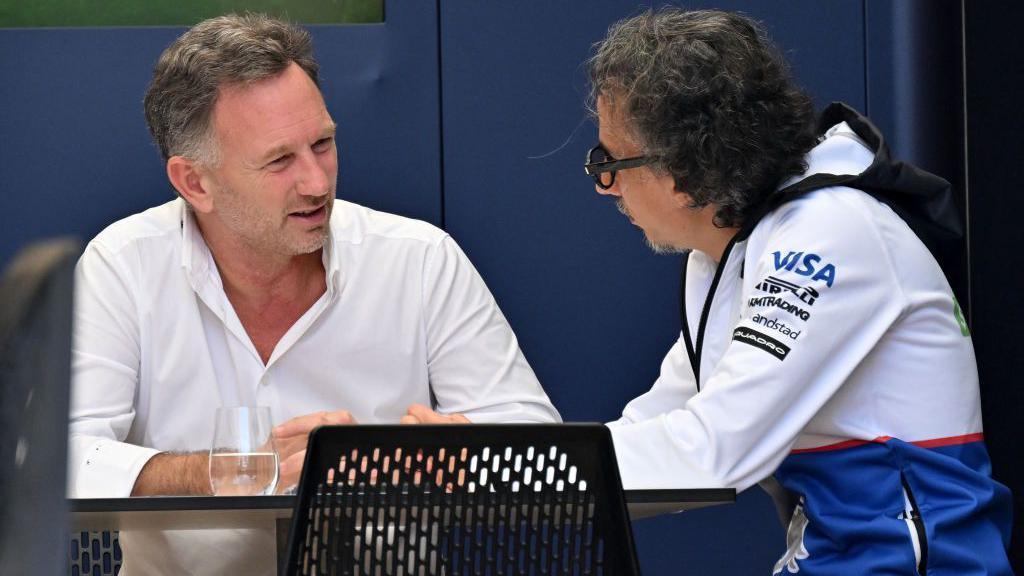Life after Horner - what Mekies will bring to Red Bull

Laurent Mekies began his Formula 1 career with Arrows in 2001
- Published
Laurent Mekies intends to be a light-touch boss of Red Bull in Formula 1, at least for the period that he is settling in with his new team.
The 48-year-old Frenchman took over as team principal and chief executive officer of Red Bull Racing after Christian Horner was sacked by the shareholders three days after the British Grand Prix.
Ultimately, Mekies' job is to turn around the performance of a team that has been suffering a competitive decline for the past 18 months.
And in terms of getting off to a positive start, this weekend's Belgian Grand Prix could not, on paper, be a better place for Mekies to make his first public appearance in his new role.
Horner's demise at Red Bull: What we know happened and why
- Published9 July
Is Verstappen more likely to stay at Red Bull with Horner gone?
- Published10 July
How to follow Belgian Grand Prix on the BBC
- Published3 August
Spa success would not end Red Bull problems
Red Bull's lead driver Max Verstappen has struggled to compete with the McLarens of Oscar Piastri and Lando Norris on a consistent basis this year, but the circuits where he has been able to are fast and flowing - exactly like Belgium's Spa-Francorchamps.
Verstappen, after all, was on pole at high-speed Silverstone three weeks ago, only for his race to come unstuck in the wet as a consequence of the low-downforce set-up Red Bull chose.
Spa is famous for its long, demanding, fast corners, just like Suzuka, where Verstappen won from pole. It would be no surprise to see him repeat that feat this weekend.
While that would be a nice fillip for the new Mekies-led Red Bull, it would not be an indication that their problems were behind them.
The team's struggles this year were central in the mix of issues that led to Horner's departure. The shareholders - tired, too, of Horner's demands to be in total control of everything while the team appeared to be fracturing around him - felt something needed to be done.
But this is still the core of the team that two years ago produced the most dominant season in F1 history, and for which last year Verstappen won seven of the first 10 races to lay the foundations for his fourth world title.
So it was no surprise to hear Mekies pledging, in a video distributed by Red Bull, to get the best out of what he describes as "this incredible team".
As someone who has been in F1 for more than 20 years, and who has worked at governing body the FIA and Ferrari in addition to two stints at Red Bull's junior team, Mekies already knows well several key people at Red Bull, such as technical director Pierre Wache and head of engineering Paul Monaghan.

Red Bull's Max Verstappen has won three of the past four Belgian Grands Prix at the famous Spa-Francorchamps circuit
A new Red Bull emerges - without Newey
Mekies has spent the last two weeks getting to know the staff at Red Bull's base in Milton Keynes. In Spa, he has a chance to watch first-hand a race team which still has a claim to be in many aspects - strategy, nimbleness, mixing improvisation with aggression - the best in the business, notwithstanding its recent difficulties.
He says he wants to "discover the magic". His first few weeks in charge, he says, will be about "listening to the people to try to understand this beautiful magic machine that is Red Bull F1, and eventually find a way to contribute and support".
There was a dichotomy, and a paradox, about Red Bull under Horner. On the one hand, he built it in his own image - and he led a pyramid-like structure from the top.
At the same time, he built the design and engineering aspect of the team around design chief Adrian Newey, organising the people around him to get the best out of Newey's creativity.
The result was success - and plenty of it. Eight drivers' titles, six constructors' championships, 124 grand prix wins. Even when Red Bull fell from competitiveness during the early years of hybrid engines, their chassis was still for the most part regarded as one of the best in the field. It was Renault's power-units that fell short.
Red Bull's competitive decline started as soon as Newey left. How much of that was coincidence - in the context of McLaren's rise to prominence and the weaknesses of Red Bull's current car-design philosophy being exposed - and how much cause remains a point of debate. The truth is probably a bit of both.
Now both Horner and Newey have gone, and a new Red Bull has to emerge. Mekies has to forge a new team that can return to the top without Newey's influence.
Are Aston Martin dark horses to sign Verstappen?
- Published22 July
Mekies is 'different character' from Horner

Christian Horner (left, with Laurent Mekies) spent 20 years as Red Bull team principal
Horner was the boss who was accused of sexual harassment and coercive, controlling behaviour by a female employee, accusations which were dismissed by two internal investigations last year and always denied by Horner.
He was the guy who lost Newey, the sport's pre-eminent design genius. And Jonathan Wheatley, the sporting director who masterminded the best-drilled team in the pit lane. And Will Courtenay, the head of the strategy at the team that, for the past decade and more, has had the best and most improvisational race operations, and who is bound at some point for McLaren.
Horner, is the man whose in-your-face approach led Mercedes F1 boss Toto Wolff to describe him as a "yapping little terrier". It's an image he was aware of himself - he even asks whether he is being portrayed as the "villain" midway through the latest series of Netflix's successful Drive to Survive series. He was.
Horner built up this image - whether intentionally or just because of who he is - over many years. Not least through the dramatic 2021 season and his key interventions with former race director Michael Masi, which preceded the Australian's mishandling of the rules during the final race in Abu Dhabi, which directly led to Verstappen taking the championship from Lewis Hamilton.
Teams are a reflection of their culture, and culture is a reflection of leadership, so it's perhaps no surprise that Red Bull have become the team many people love to hate.
Red Bull's brand image is about edginess, fun and disruption. Under Horner's controlling influence, the shareholders felt something of the spirit of Red Bull had been lost in recent times.
Mekies' arrival is a chance for a clean slate. He is a very different character from Horner.
An engineer with extensive experience of F1, he can engage with the technical team on an in-depth level.
In that way, he is a 'technical team principal', as McLaren Racing chief executive officer Zak Brown refers to Andrea Stella, who has been such a revelation since becoming McLaren team boss at the end of 2022.
As a character, Mekies seems so far to be softer, less prickly and less adversarial than Horner. While still a keen competitor, he might be expected to take a different approach to any disputes that arise externally.
The controversies surrounding Horner - the allegations; his volatile relationship with Verstappen's father Jos; questions about the driver's future; the drip-drip exodus of major figures - had led to something of a siege mentality at Red Bull.
Mekies' arrival is a chance for that to change, and for Red Bull to forge a new relationship, with their rivals, with the sport and with its audience.